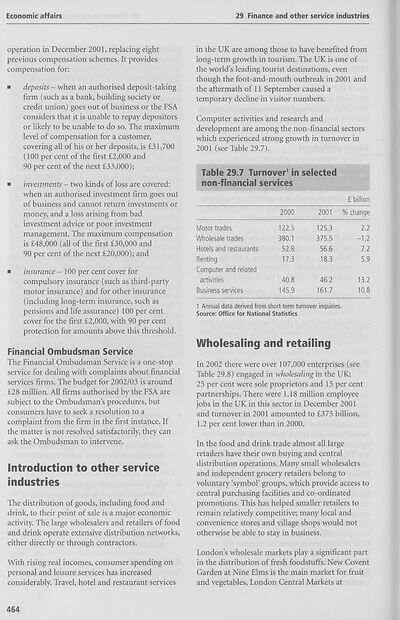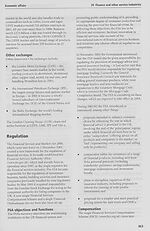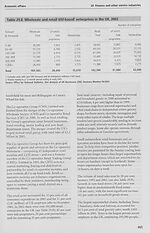Download files
Complete book:
Individual page:
Thumbnail gallery: Grid view | List view

Economic affairs
29 Finance and other service industries
operation in December 2001, replacing eight
previous compensation schemes. It provides
compensation for:
■ deposits - when an authorised deposit-taking
firm (such as a bank, building society or
credit union) goes out of business or the FSA
considers that it is unable to repay depositors
or likely to be unable to do so. The maximum
level of compensation for a customer,
covering all of his or her deposits, is £31,700
(100 per cent of the first £2,000 and
90 per cent of the next £33,000);
■ investments - two kinds of loss are covered:
when an authorised investment firm goes out
of business and cannot return investments or
money, and a loss arising from bad
investment advice or poor investment
management. The maximum compensation
is £48,000 (all of the first £30,000 and
90 per cent of the next £20,000); and
■ insurance - 100 per cent cover for
compulsory insurance (such as third-party
motor insurance) and for other insurance
(including long-term insurance, such as
pensions and life assurance) 100 per cent
cover for the first £2,000, with 90 per cent
protection for amounts above this threshold.
Financial Ombudsman Service
The Financial Ombudsman Service is a one-stop
service for dealing with complaints about financial
services firms. The budget for 2002/03 is around
£28 million. All firms authorised by the FSA are
subject to the Ombudsman’s procedures, but
consumers have to seek a resolution to a
complaint from the firm in the first instance. If
the matter is not resolved satisfactorily, they can
ask the Ombudsman to intervene.
Introduction to other service
industries
The distribution of goods, including food and
drink, to their point of sale is a major economic
activity. The large wholesalers and retailers of food
and drink operate extensive distribution networks,
either directly or through contractors.
With rising real incomes, consumer spending on
personal and leisure services has increased
considerably. Travel, hotel and restaurant services
in the UK are among those to have benefited from
long-term growth in tourism. The UK is one of
the world’s leading tourist destinations, even
though the foot-and-mouth outbreak in 2001 and
the aftermath of 11 September caused a
temporary decline in visitor numbers.
Computer activities and research and
development are among the non-financial sectors
which experienced strong growth in turnover in
2001 (see Table 29.7).
Table 29.7 Turnover1 in selected
non-financial services
£ billion
2000 2001 % change
Motor trades
Wholesale trades
Hotels and restaurants
Renting
Computer and related
activities
Business services
122.5 125.3 2.2
380.1 375.5 -1.2
52.8 56.6 7.2
17.3 18.3 5.9
40.8 46.2 13.2
145.9 161.7 10.8
1 Annual data derived from short-term turnover inquiries.
Source: Office for National Statistics
Wholesaling and retailing
In 2002 there were over 107,000 enterprises (see
Table 29.8) engaged in wholesaling in the UK;
25 per cent were sole proprietors and 15 per cent
partnerships. There were 1.18 million employee
jobs in the UK in this sector in December 2001
and turnover in 2001 amounted to £375 billion,
1.2 per cent lower than in 2000.
In the food and drink trade almost all large
retailers have their own buying and central
distribution operations. Many small wholesalers
and independent grocery retailers belong to
voluntary ‘symbol’ groups, which provide access to
central purchasing facilities and co-ordinated
promotions. This has helped smaller retailers to
remain relatively competitive; many local and
convenience stores and village shops would not
otherwise be able to stay in business.
London’s wholesale markets play a significant part
in the distribution of fresh foodstuffs. New Covent
Garden at Nine Elms is the main market for fruit
and vegetables, London Central Markets at
464
29 Finance and other service industries
operation in December 2001, replacing eight
previous compensation schemes. It provides
compensation for:
■ deposits - when an authorised deposit-taking
firm (such as a bank, building society or
credit union) goes out of business or the FSA
considers that it is unable to repay depositors
or likely to be unable to do so. The maximum
level of compensation for a customer,
covering all of his or her deposits, is £31,700
(100 per cent of the first £2,000 and
90 per cent of the next £33,000);
■ investments - two kinds of loss are covered:
when an authorised investment firm goes out
of business and cannot return investments or
money, and a loss arising from bad
investment advice or poor investment
management. The maximum compensation
is £48,000 (all of the first £30,000 and
90 per cent of the next £20,000); and
■ insurance - 100 per cent cover for
compulsory insurance (such as third-party
motor insurance) and for other insurance
(including long-term insurance, such as
pensions and life assurance) 100 per cent
cover for the first £2,000, with 90 per cent
protection for amounts above this threshold.
Financial Ombudsman Service
The Financial Ombudsman Service is a one-stop
service for dealing with complaints about financial
services firms. The budget for 2002/03 is around
£28 million. All firms authorised by the FSA are
subject to the Ombudsman’s procedures, but
consumers have to seek a resolution to a
complaint from the firm in the first instance. If
the matter is not resolved satisfactorily, they can
ask the Ombudsman to intervene.
Introduction to other service
industries
The distribution of goods, including food and
drink, to their point of sale is a major economic
activity. The large wholesalers and retailers of food
and drink operate extensive distribution networks,
either directly or through contractors.
With rising real incomes, consumer spending on
personal and leisure services has increased
considerably. Travel, hotel and restaurant services
in the UK are among those to have benefited from
long-term growth in tourism. The UK is one of
the world’s leading tourist destinations, even
though the foot-and-mouth outbreak in 2001 and
the aftermath of 11 September caused a
temporary decline in visitor numbers.
Computer activities and research and
development are among the non-financial sectors
which experienced strong growth in turnover in
2001 (see Table 29.7).
Table 29.7 Turnover1 in selected
non-financial services
£ billion
2000 2001 % change
Motor trades
Wholesale trades
Hotels and restaurants
Renting
Computer and related
activities
Business services
122.5 125.3 2.2
380.1 375.5 -1.2
52.8 56.6 7.2
17.3 18.3 5.9
40.8 46.2 13.2
145.9 161.7 10.8
1 Annual data derived from short-term turnover inquiries.
Source: Office for National Statistics
Wholesaling and retailing
In 2002 there were over 107,000 enterprises (see
Table 29.8) engaged in wholesaling in the UK;
25 per cent were sole proprietors and 15 per cent
partnerships. There were 1.18 million employee
jobs in the UK in this sector in December 2001
and turnover in 2001 amounted to £375 billion,
1.2 per cent lower than in 2000.
In the food and drink trade almost all large
retailers have their own buying and central
distribution operations. Many small wholesalers
and independent grocery retailers belong to
voluntary ‘symbol’ groups, which provide access to
central purchasing facilities and co-ordinated
promotions. This has helped smaller retailers to
remain relatively competitive; many local and
convenience stores and village shops would not
otherwise be able to stay in business.
London’s wholesale markets play a significant part
in the distribution of fresh foodstuffs. New Covent
Garden at Nine Elms is the main market for fruit
and vegetables, London Central Markets at
464
Set display mode to:
![]() Universal Viewer |
Universal Viewer | ![]() Mirador |
Large image | Transcription
Mirador |
Large image | Transcription
The item on this page appears courtesy of Office for National Statistics and may be re-used under the Open Government Licence for Public Sector Information.
| Britain and UK handbooks > UK: The official yearbook of the United Kingdom of Great Britain and Northern Ireland > 2003 > (514) |
|---|
| Permanent URL | https://digital.nls.uk/204929795 |
|---|
| Attribution and copyright: |
|
|---|---|
| Description | Three volumes of 'UK: The official yearbook of the United Kingdom of Great Britain and Northern Ireland', published annually by the Office of National Statistics from 2002-2005. |
|---|---|
| Shelfmark | GII.11 SER |
| Description | Three titles produced by the British Government from 1954-2005 describing 'how Britain worked'. They are: 'Britain: An official handbook' (1954-1998), 'Britain: The official yearbook of the United Kingdom' (1999-2001), and 'UK: The official yearbook of the United Kingdom of Great Britain and Northern Ireland' (2002-2005). These 50 reports provide an overview of Britain's economic, social and cultural affairs, its environment, international relations, and the systems of government. They give an impartial summary of government policies and initiatives, and explain how public services are organised. |
|---|---|
| Additional NLS resources: |
|

